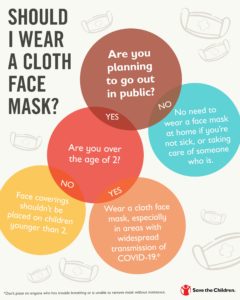How to Talk About Cloth Face Masks with Children
As COVID-19 continues to spread, Save the Children is helping families and health workers get through this pandemic by delivering life-saving supplies, crucial health information and other support in Canada and around the world.
We’re also providing parents, caregivers and communities with tools and tips you can trust about coronavirus and kids, including helping to clearly explain the on the use of cloth face masks to help slow the spread of COVID-19
Health Canada is advising the public to wear homemade cloth face coverings as an additional measure you can take to protect others around you. Cloth masks can be useful for short periods of time, when physical distancing is not possible such as when grocery shopping or using public transit.
Should I wear a cloth face mask?
Our experts put together 4 simple ways to explain the guidelines for wearing cloth face masks in public to children.

- Start with social distancing. While kids are aware of school closures and event cancellations, it’s important they also understand why and how these critical steps help slow the spread of COVID-19. Staying home and putting distance—at least two metres—between yourself and others is one of the most effective ways to reduce the spread of coronavirus.
- Prep for public settings. You may find that you or your children will be in a public setting like a grocery store or bus stop where social distancing measures are difficult to maintain. It’s important to explain to kids that in these instances, wearing a cloth face mask is recommended because it can help to slow the spread of the virus.
- Talk about how to care for someone sick at home. If there’s someone sick at home, Health Canada has specific guidelines for how to prevent the spread of germs. Not only should the sick person wear a cloth face covering when they are around people, others should wear one while in the same room with them.
- Distinguish cloth face masks from other kinds of masks. Many children are aware that face masks are not allowed at school during celebrations like Halloween. It’s important to distinguish coronavirus-related cloth face masks from other types, like those worn as costumes or as protective gear in sports.
Please note that cloth face coverings should not be placed on young children under age 2, anyone who has trouble breathing or those unable to remove the mask without assistance. It is important to understand that non-medical masks have limitations and need to be used safely. For further advice on cloth face masks, visit Health Canada.


